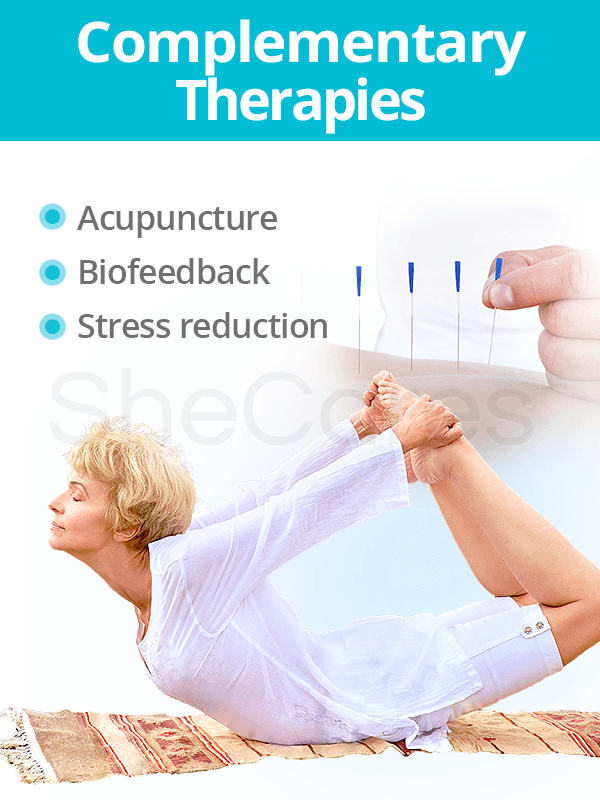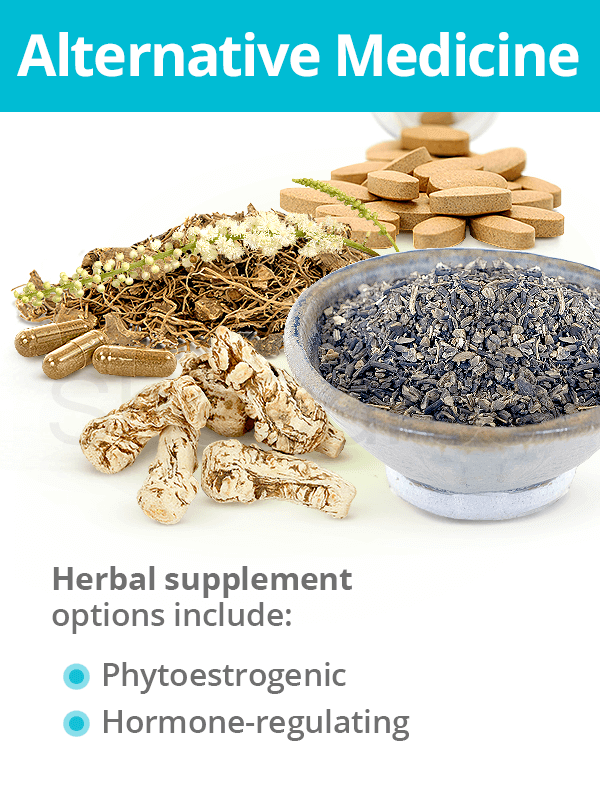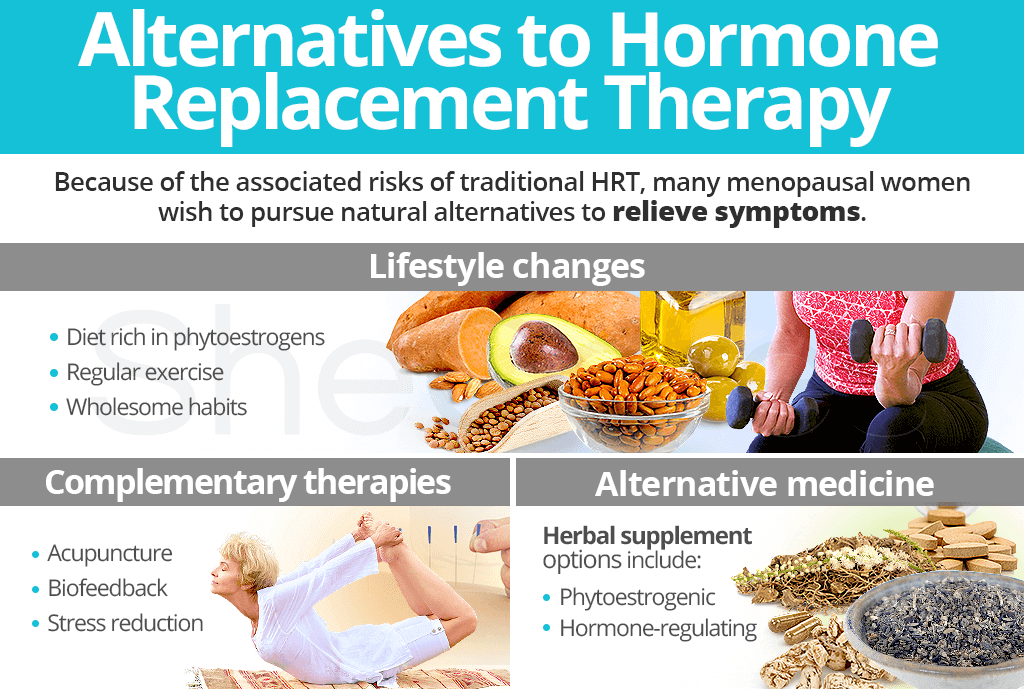Hormone replacement therapy (HRT) is a means of replenishing the body's hormones in the event of a deficiency. The therapy is commonly prescribed to treat menopause symptoms, and it can be either natural or synthetic. However, women may wish to consider lower-risk HRT alternatives first.
Continue reading to learn about alternatives to hormone replacement therapy before putting your long-term health in risk with the use of synthetic hormones.
Three Alternatives to HRT for Menopause Symptoms
Three different approaches can be considered as natural alternatives to hormone replacement therapy. These are categorized as: (1) lifestyle changes, (2) complementary therapies, and (3) alternative medicine.
Lifestyle changes

This option involves no risk, but it requires significant willpower to make and stick with daily adjustments.
This natural alternative to HRT starts with an improved diet focused around the three macronutrients: lean protein, centered on plant-based options like beans, nuts, and lentils; complex carbs, such as sweet potatoes, brown rice, and whole grains; and healthy fats, like avocadoes, nuts, olive oil, etc.
Menopausal women are also encouraged to eat foods rich in phytoestrogens, which are plant-based estrogens that work as the body's own, thus filling the hormonal gap. They can be found in flax seed, sesame seeds, soy products, oats, and more.
Furthermore, women are encouraged to participate in regular exercise to boost mood, improve sleeping patterns, and maintain a healthy weight. Combine cardio with weight-bearing and strength training exercises for optimal bone health. At least 30 minutes a day, five days a week is recommended.
Moreover, to find natural relief from menopause symptoms, women should strive to practice wholesome habits that include quitting smoking, cutting down on excessive caffeine intake, and participating in activities that relieve stress, such as a favorite hobby.
Complementary therapies

Acupuncture is a Chinese medical treatment involving the insertion of very fine, sterile needles into the body at specific points, according to a mapping of “energy pathways.” By doing so, acupuncturists look to correct the hormonal imbalance at fault for the menopause symptoms.
Some women may also choose to pursue biofeedback to help certain perimenopause symptoms. Biofeedback is a therapeutic technique that teaches a woman to control physical responses - breathing, muscle tension, heart rate, brain activity, etc. - by focusing on and modifying signals from the body.
Also, some women may wish to further partake in stress-reduction therapies of yoga, tai chi, muscle relaxation, and deep breathing exercises for additional relaxation. These will help lower cortisol levels, thus contributing to hormonal equilibrium.
If you wish to pursue complementary therapies, seek appropriate help from professionals, such as a licensed acupuncturist or a healthcare professional specializing in biofeedback. With biofeedback, once the technique is perfected, it is possible to perform at home.
Alternative medicine

There are two types of herbal supplements that can work as natural hormone replacement alternatives: phytoestrogenic and hormone-regulating herbal supplements.
Phytoestrogenic supplements, like black cohosh and dong quai, contain higher concentrations of phytoestrogens than foods and work to replace some of the missing estrogen in the body, thus relieving an estrogen deficiency at fault for the majority of menopause symptoms.
However, long-term use is not recommended as the body will start to produce less of its own estrogen hormones in return. Work with a certified herbalist to find the correct dosage and treatment schedule.
In contrast, hormone-regulating herbal supplements, like Macafem, nourish the pituitary and endocrine glands into producing its own hormones more efficiently. This ultimately balances not only estrogen levels, but also those of progesterone and testosterone.
Because hormone -regulating herbal supplements do not introduce exogenous hormones into the body, they are safer for long-term use and, thus, considered one of the best alternatives to HRT for treating hormonal imbalance.
Key Takeaways
Even when used separately, lifestyle changes, complementary therapies, or alternative medicines are viable alternatives to hormone replacement therapy. However, most women looking for the best natural HRT alternatives try a combination of approaches that suits their lifestyle and specific needs best. Speak with your doctor about what route to take to find long-term relief from life-disrupting menopause symptoms.
Sources
- Dr. Susan Love Research Foundation. (n.d.). Alternatives to HRT: Complementary Care. Retrieved March 25, 2019, from https://www.drsusanloveresearch.org/alternatives-hrt-complementary-care
- Harvard Health Publishing. (2017). Dealing with symptoms of menopause. Retrieved March 25, 2019, from https://www.health.harvard.edu/womens-health/dealing-with-the-symptoms-of-menopause
- Healthy Women. (n.d.). Biofeedback. Retrieved March 25, 2019, from https://www.healthywomen.org/condition/biofeedback
- Innes, K.E. et al. (2010). Mind-body Therapies for Menopausal Symptoms: A Systematic Review. Maturitas, 66(2), 135-149. doi: 10.1016/j.maturitas.2010.01.016
- NHS. (2016). Alternatives: Hormone replacement therapy (HRT). Retrieved March 25, 2019, from https://www.nhs.uk/conditions/hormone-replacement-therapy-hrt/alternatives/
- The North American Menopause Society. (n.d.). Bone Health: Exercise Is a Key Component. Retrieved March 25, 2019, from https://www.menopause.org/for-women/menopauseflashes/bone-health-and-heart-health/bone-health-exercise-is-a-key-component



